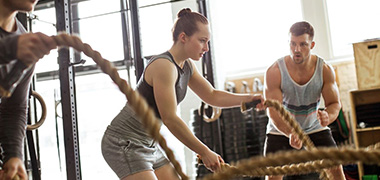
How do I become a sports nutritionist?
Bachelor of Sport and Exercise Science (Honours)
- There are no mandated entry requirements.


Bachelor of Nutrition and Dietetics
- There are no mandated entry requirements.


Related occupations
Health Coach
A Health Coach guides clients on dietary, exercise, and lifestyle changes, creating personalised plans to improve overall wellbeing and inspire healthy habits.
Dietitian
A Dietitian advises clients on nutrition and dietary needs, conducts assessments, and designs meal plans, requiring strong communication and personal skills.
Nutrition Assistant
A Nutrition Assistant advises clients on nutritional needs and meal plans under a qualified nutritionist's guidance, focusing on individual circumstances.
Weight Loss Consultant
A Weight Loss Consultant advises clients on diet, nutrition, and exercise, providing motivation and support to achieve their weight loss goals.
Diabetes Educator
A Diabetes Educator informs patients and healthcare professionals about diabetes management and prevention, requiring excellent communication and organisational skills.
Dietetic Assistant
A Dietetic Assistant supports a dietitian in creating meal plans, advising on nutrition, and assisting clients with varied dietary needs.
Nutrition Advisor
Nutrition Advisors promote healthy eating by developing educational programs and resources, evaluating food products, and working with clients on dietary choices.
Nutrition Scientist
A Nutrition Scientist researches the impact of food and nutrients on health, conducting experiments and analysing data to improve public health through better nutrition.
Nutritional Therapist
Nutritional Therapists guide clients on diet and health, creating personalised plans and educating them on nutrition to improve wellness.
Nutritionist
Nutritionists improve diets and eating habits by providing personalised advice, creating educational programmes, and advising organisations on nutrition.
Public Health Nutritionist
A Public Health Nutritionist enhances community health by promoting healthy eating, analysing dietary patterns, and implementing nutrition programmes.
Community Nutritionist
A Community Nutritionist promotes healthy eating by designing programmes, providing dietary advice, and educating the public on nutrition.
Clinical Dietitian
A Clinical Dietitian develops and manages personalised nutrition plans for patients, collaborating with healthcare teams to promote optimal health.
Sports Dietitian
A Sports Dietitian advises athletes on nutrition for improved performance and recovery, tailoring plans and collaborating with coaches for optimal health.
Common questions
How much do Sports Nutritionists earn?
The weekly salary for a Sports Nutritionist in Australia typically ranges from approximately $875 to $1,000. Increase your earning capacity by obtaining post-graduate qualifications such as the Graduate Certificate in Performance Health Management, Graduate Diploma of High Performance Sport, or Master of Sports Nutrition by Research.
What are the job opportunities for Sports Nutritionists?
There are 11,800 nutrition professionals currently working in Australia, some of these are Sports Nutritionists. They are employed by health and fitness centres, sports clubs, schools and universities, professional athletes, and large sporting teams. Some Sports Nutritionists work independently through their own private consultancy.
How do I become a Sports Nutritionist?
Launch your career as a Sports Nutritionist with a double-degree Bachelor of Exercise and Sport Science/Bachelor of Nutrition Science or a Bachelor of Exercise Physiology + Master of Nutrition. You should also consider specialist qualifications such as the Graduate Diploma of Applied Sports Nutrition or the Master of Nutrition and Dietetics. You will also benefit by registering with a professional association such as Sports Nutrition Australia.
Source: Australian Government Labour Market Insights 2023
Further reading


5 careers with high job satisfaction
5th August 2021)

